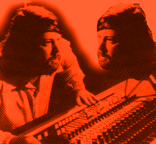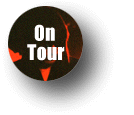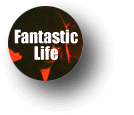

Last Days of May-
Inner System Blues CD
|
Time Out New York, January 23-30, 2003 "Like any work of art, a record is at its best when it creates its own universe and ushers us into it. Such albums prove more lasting and ultimately rewarding experiences than simple escapism; they're also all too rare these days. But guitarist Karl Precoda has several to his credit, first with one of L.A.'s best '80s bands, Dream Syndicate, and now, leading his own group, Last Days of May. Since 1984, when Precoda left Dream Syndicate after its first breakup (he didn't return when it reformed a year later), he's kept the lowest of profiles: Neither Trouser Press nor All Music Giude, each an encyclopedic web guide to music, acknowledges Last Days of May, and on Dream Syndicate's entry, AMG even describes him as being "M.I.A.," despite the fact that this is Last Days' third album. But no amount of obscurity, self-imposed or not, can defeat music this powerful. Over the course of five long pieces, Precoda & Co. spin eneffably compelling instrumental rock, stuff that seems to move on its own impulse and speak in an alien but knowable language. The CD's cover is a perfect (and likely intended) analogy: four striking and close-lipped faces, rendered in dramatic lines and vibrant colors, looking as if they held the secret of life, which no words are capable of expressing. Precoda may be the finest living rock guitarist that current rock fans have neither heard nor heard of. While the band flows between fleet-footed krautrock gallops and an open-ended atmospheric warmth, Precoda spins brilliant lines of melody, tension and noise, shooting off sparks and colorful pinwheels of effects. The 14-minute "Drive, It Said" is dark and foreboding (a good thing), but most of the rest, such as the mournful "Bridge of Smoke," is challenging yet not inaccessible. That's an important distinction, since an instrumental rock album with five long tracks fairly screams to be filed-and thus avoided by most people-as EXPERIMENTAL. But if wordless rock music's emotional potential interests you even slightly, the rewards of Inner System Blues far outreach the risks."-Mike Wolf Baltimore City Paper (January 29 - February 4, 2003) [In a review with Kinski's Airs Above Your Station] "Last Days of May also revisits prog for Inner System Blues, but whereas Kinksi translates 1970s epic sinusoidal ebb and flow into digital-age deconstruction, LDOM assays krautrock's polyglot musical vocabulary. Mid-'90s postrock tried it once, but what started out as a promising brew of Amerindie postpunks melding Amon Düül and Bitches Brew quickly became an intellectual rigidity that forgot about songs. Tortoise flew improv's flag only to concoct something more tightly puckered than John Ashcroft's sphincter; LDOM's instrumental intricacy thankfully doesn't forget that it is rhythm's duty to please that booty. Which is not to say that System is a dancing machine--it's more like a live-recording rock manifesto on dub's groove thang. Drummer James Ralston and bassist Thomas Howard crank out a street-fighting punch combination that rivals Can's Jaki Liebezeit and Holger Czukay at their zoned-out, bareknuckled best. Over this big fun, ex-Dream Syndicate guitarist Karl Precoda conjures unorthodox, serpentine lines that, while not as flamboyantly unhinged as Pete Cosey's '70s work for Miles Davis, emanate from the same dark region of the brain. He circles through "Rangerland/Bewitched" like a tiger on the prowl, and by the time its predatory 12-minutes winds down, you think the hunter hasn't pounced only to discover you've been bleeding from the jugular ever since it kicked off. System may turn out to be like P.I.L.'s Second Edition, an album so far removed from the norm that only critics christen now but which every hipster will herald in a decade. Precoda's presence--the blistering tone that sounded mature on Syndicate's "Halloween" has blossomed ornery ornate--sears this jazz-inflected percussion meltdown, and it's a tonic for ears looking for a band that doesn't just think outside rock's box but abandons it entirely. Look no further."-Bret McCabe The Wire February 2003 "Last Days of May are an instrumenal power trio based around the precocious talents of former Dream Syndicate (Steve Wynn's, as opposed to La Monte Young's) guitarist Karl Precoda. His new group are more straightforwardly psychedelic, with both the bass and guitar coated in phase and echo, creating cavernous arcs of sound that recall electric Miles Davis. A live recording, Inner System Blues perfectly captures the group's ominous dynamic. The set opens with "Tell A Green Man Something," its blur of treated birdcalls giving way to a slightly dubby bass and some flickering hand percussion. Precoda wrestles with his guitar lead, sending sparks of electricity through his FX rack, but for the most part he holds back. Indeed, it's not until "Bridge of Smoke" that he really lets go, pouring great fuzzy chords and spurts of wah-wah onto a black backdrop that's vibrating with expectation."-David Keenan "Writing about Inner System Blues is tricky, because it lacks many of the features usually present on a typical rock record, or even a typical psychedelic rock record. There are no vocals, few melodies (and, by extension, little of the bluesy wank of fellow Squealer psych act Major Stars) and little in the way of contrast. Weıre left with a jigsaw puzzle with several pieces missing. Still, Last Days Of May dares you to put it together. The components of a Last Days Of May song are simple: a simple bass and drum groove, waves of reverbed guitar, and maybe some congas or samples. The occasional THWACK-thwack-thwack attacks from the drums and samples sound like percussion hits on a dub record. The lazy, echoing guitar parts by Karl Precoda, who used to be in the Dream Syndicate (the '80s guitar pop group, not the LaMonte Young drone group) would recall My Bloody Valentine or Slowdive if Precoda's guitar playing had been overdubbed more. Like the guitar work on late-period Bailter Space albums, Precodaıs playing sounds like itıs trying to fill more space than one guitar is capable of filling. In fact, were it not for its intriguing emotional elusiveness, Inner System Blues would closely resemble Bailter Spaceıs Solar.3, a loose, awkward and spare psych record that doesnıt feature enough layering to reach the sort of over-the-top bliss-out it yearns to achieve. Unlike Solar.3, though, Inner System Blues hasnıt got all its cards on the table. Inner System Blues doesnıt sound anything like P.I.L.ıs Second Edition, for example, but it has a similar puzzling, blank-stare feel. More genre-specific reference points include Disco Infernoıs D.I. Go Pop and The Hair And Skin Trading Co.ıs Psychedeliche Musique. Although both of those records are texturally richer than Inner System Blues, they all seem to come from minds that arenıt thinking in the usual way. They leave me wondering exactly why the musicıs creators made the aesthetic choices they did, and thatıs a wonderful thing. Unfortunately, Inner System Blues loses steam about halfway through, becoming a rather ordinary psych record by its end. The last twenty-five minutes of the album find the band playing without enough consistency to develop a hypnotic groove or enough contrast to generate surprise. This may have to do with the absence of percussionist Leonard Wishart on the last two tracks. But before that, Inner System Blues is weird, expansive and hard to pin down, as any good psychedelic record should be."-Charlie Wilmoth London Sunday Times February 2, 2003 "In Dream Syndicate, Karl Precoda's white-hot guitar counterbalanced Steve Wynn's Lou Reed fixation in a unique but effective musical personality clash. But as the group pursued a more linear direction, there was no place for Precoda's disorienting approach. His third album fronting Last Days Of May features five instrumentals and opens with the echoing "Tell A Green Man Something," before "Rangerland/Bewitched" sees Precoda scratch a series of clicks and crackles through a landscape redolent of Miles Davis's atmospheric 1970s excursions. "Bridge Of Smoke" drowns a classic rock riff in delicious, deep-sea dub effects, "Drive, It Said" abandons truncated guitar solos in percussive clatter, and "Solitary Realizer Vehicle" rehabilitates the Hawkwind-style overdriven guitar sound previously presumed lost in lava-lamp land."-Stewart Lee "On Inner System Blues, Last Days of May leaves aside much of the ferocity of prior releases to turn within for an otherworldly journey of cavernous instrumental wherein drips the space-suggestion drips of reverb-laden electronics. The deep, ominous bass tone coloring suggests Bauhaus and those slowly percolating beats recall chill out ambient music. Still, present is the kit drummer restrained onto just allowing the glitter of cymbals to work into the music. Such is the subterranean journey of headspace music here. Don the headphones and lay back, it is going to be an interesting trip. (4.5)"-Tom Schulte The Hook #0205, February 6, 2003 "The CD jacket of Inner System Blues, the third album by The Last Days of May, is covered with multihued portraits of sad-faced, weary businessmen. They stand in groups, immobilized by despair, as if they'd just been shown a glimpse of an alternate existence, a sunnier life where freedom cradled their futures. Like the face screaming down from King Crimson's Court, these men have no idea what to do with their newfound knowledge. Introducing... prog(ressive) rock. Karl Precoda, perhaps the most central figure in LDOM, first achieved fame in the early eighties as the guitarist for the Dream Syndicate, an L.A.-based, Byrds-influenced, jangle-pop group. Years later, he resurfaced in Charlottesville and pieced together the band in 1997 with bassist (and obscure music guru) Thomas Howard and percussionist James Ralston. The Last Days of May's freedom derives from their dub-influenced jams. There are no riffs, solos, verses, or vocals. As an instrumental trio, with keyboardist Leonard Wishart occasionally guesting on their albums, LDOM prefers to stay instead as riders on the storm. Their albums have garnered them considerable press, even overseas reviews. It's understandable why. The sound echoing from Precoda's guitar seems like a type of freeform speech. While listening to Inner System Blues, a rapid blur of images filled my mind: submarine radar blips, chirring birds, humming power lines, crackling radio towers, insects skittering across the surface of a pond. Their dark, spectral assaults cross killer bees with krautrock, the pulsing, jazzy, experimental sound pioneered in the sixties by German psychedelic bands Can and Neu!. And on this album, the pieces grow organically, like clouds at the meeting of the fronts, billowing over landscapes of rhythmically repetitive, funked-out basslines. To get a true sense of LDOM, listen to the pieces grow, shift form, and evolve over marathon stretches, as in the highlight track, "Rangerland/Bewitched." It's a shame that so many prog rock bands of the last two decades fell victim to unidirectional senility, by either 1) confusing "bombast for majesty" (see Yes, Genesis), or 2) becoming so dogged in their pursuit of the impossibly complex (see Tortoise, Don Caballero) that they played with the warmth of a toaster oven. The Last Days of May have a soul, and although it might not be conducive to airplay, it's worth listening to."-Amy Briggs Cosmik Debris August 2003 "Cool, spooky instrumental jams with throbbing bass lines and spacey guitar leads punctuated by artificial jungle noises and high-pitched squeals. The percussive section ranges from everything from a simple drum kit to bongos to something that sounds like sealed tin cans being beat on by pencils, while background washes of static and things being dropped atonally add just the right element of freakishness to the mix. The whole project was apparently recorded live somewhere - doesn't say when or where, but it sounds like it would have been a cool performance to attend. Despite being a live recording, the overall quality is exceptionally crisp and clean without losing any of the free spiritedness that comes with a good live show."-Holly Day |
Reviews for the Radiant Black Mind CD
|
Rolling Stone August 31, 2000 "Last Days of May have the hipness thing sewn up: a name taken from a Blue Oyster Cult song; a celebrity ax wrangler in Karl Precoda, the founding lead guitarist of the Dream Syndicate. Last Days are also an instrumental combo of empathic ferocity, making a regal shape-shifting noise on Radiant Black Mind that is a singular digestion of electric Miles Davis, the first Stooges album and, in Precoda's molten reveries, both John Coltrane's tenor sax and Lou Reed's free-guitar shriek. In all, a most luxurious and inspired bedlam."-David Fricke Phoenix New Times February 20, 2000 "Time for a Jimi Hendrix moment. Imagine, for just a minute, that you're shuffling around on a
Manhattan sidewalk outside the Fillmore East one late December
1969 afternoon. Longhaired, pock-faced roadies have been rolling
gear into the legendary venue for a couple of hours, and you notice
that a pair of them who've just cut out and down the alley for
a smoke break accidentally left a side door ajar. Naturally, you
seize the opportunity and slip in. Wandering down a corridor,
you abruptly turn, push through a thick red velvet curtain, and
suddenly there you are standing stage right, jaw slowly dropping
below your knees: No less than 20 feet away is the Band of Gypsies,
jamming in all its pre-concert glory, oblivious not only to your
presence but to just about everything else in this otherwise busy
intersection of roadies, lighting techs, sound men, concession
vendors, etc. All Music Guide Online (Three Stars) "Dream Syndicate guitarist Karl Precoda leads the Virginia-based Last Days on their second CD, which explores free rock territory. Precoda's clattery, distended, psycho-delic guitar feeds back to itself in question and answer mode, yet there's a cleanliness to his dense sound which renders it fairly organized and decipherable. Rhythm mates Thomas Howard and James Ralston keep the beat focused, but expand upon Precoda's take-no-prisoners concept, heading for terrain similar to Blue Cheer, Jimi Hendrix, or Sun Ra. A slow, bluesy beat is the foundation for "The Mezz," the most straightforward effort of the five cuts. A beat of 3/4 to 4/4 informs the rockish, free, and jamming "Apollo Cabinfire," a hard-driving improvisation where Precoda plays a discernible solo. The most involved and intricate piece of the date is "ECG 102A." Whale drones contrast with industrial clanking; free raking and scraping, ghostly heart throbs, afterburner jet pops, and acid-dropped dramatics are all present in a relatively free context. "Up From the Equator" sports quite scattered improvisation, solid soulful bass funk, wah wah guitar, and additional Afro-Cuban conga from fourth wheel Leonard Wishart. "The West" has an easier funk base, but is sonically rich; the clarity of Precoda's ideals are obvious to anyone who might be interested in his different, mind-swelling approach. This release is for those who realize that this type of music, which was born in the '60s, is very much alive today. It should satisfy not only the older fans of the genre, but younger listeners who remember Precoda's past glories." -Michael G. Nastos New York Press March 30, 2000 "Last Days of May leader Karl Precoda is smart. Thus he will
never attain mass popularity, nor will he win over the aging ex-college
radio DJs who worshipped at the altar of the Dream Syndicate,
the band in which he played throughout the early to mid-80s. Precoda's
excessive, overdriven chord washes defined the L.A. band's most
vital material, including their classic The Days of Wine and
Roses. When he left, frontman Steve Wynn traded raw-nerved
neo-psychedelia for worthless, trad-influenced cow-punk. Broken Face #9 (September 2000) "Karl Precoda and his Last Days of May return with a massive, hallucinatory follow-up to their '98 debut. "Radiant Black Mind" (released on Squealer this time) offers 5 more extended improvisational jams, ranging from the full-on acid dementia of that first album to more experimental or freer excursions, and all recorded live in a big room for optimum listening pleasure. "The Mezz" is a slowly meandering bit of aural hypnosis that snakes into the consciousness with nimble ease. Precoda's undulating feedback glides above the fluid bass and percussion, dropping in and back out of the mix, standing time on end with searing wah-wah eruptions. "Apollo Cabinfire" builds from crackling sparks of distortion, setting off the fiery maelstrom of the rest of the track. It's a beautiful thing to behold, making such extreme temperatures slightly more bearable. Let it burn. "ECC 102A" is the first genuinely creeped out thing on here, offering a more deconstructed form of improvisation. I wouldn't be surprised if Precoda was fan of some New Zealand noise or even Pelt for that matter (and I think he is). Then comes the double whammy of the damaged Caribbean flavor of "Up From the Equator" * astounding solo work from Karl here * and the howling slow-burn of closer "The West," with super-fried fuzz riding shotgun above a slow storm of rhythmic badness (as in coolness). My eyes glazeth over. Fans of serious guitar psych, take heed."- Mats Gustafsson C-Ville Weekly Vol. 12, No. 17, April 25-May 1, 2000 "The newest offering from former Dream Syndicate axman Karl Precoda is an all-you-can-eat psychedelic breakfast banquet served a la carte with a strange trip omelet. After migrating to Virginia a few years back, Precoda hooked up with Fire Sermon's Tom Howard, the man many local musicians might remember as Heinz Musitronics' former repair guru, and convinced him to put his energy into a fiery fusionoid band with a 100% trial-and-error modus operandi. The Last Days of May were born, a platform for Precoda 'to go for the long bomb' with his schizoid wah, squeeze-and-peel meltdown guitar style. Recorded primarily live in the studio, Radiant Black Mind is a sometimes spooky, eyebrow-raising soundtrack for a deserted space station, ambient (like the maestro, Brian Eno) at points, and driving like a liquid steamroller at others. This is not psychedelia for hippy-freaks; this is psychedelia for industrialists and apocalypse fetishists. Featuring current and former (in that order) Baaba Seth percussionists Leonard Wishart and James Ralston, this one should be in your rack of strange day tuneage."-Cripsy Duck All About Jazz Web Site April 2000 "The closest referent for this group that I can think of (and
my knowledge of this kind of music is admittedly severely limited)
is the Bay-area based Mermen, a group led by another underground
guitar icon, Jim Thomas, which traffics in similarly loose-ended
paeans to the psychedelic age. Surf overtones are largely absent
here, but the two groups share an obvious affinity for psychedelic
sound experimentation and both guitarists fraternize heavily with
the possibilities afforded by the amplification of their instruments.
"The Mezz" serves as a fitting encapsulation of their credo joining
jangling guitar, hollow percussion and electronic raindrop percussion.
Pogo-stick rhythms and snarling guitar ignite in a slow burn on
"Apollo Cabinfire." The collective groove is a subtle one that
starts out slow, but soon gains momentum and grabs you by the
seat of the pants chucking you head long into an ever-widening
sonic breach. All the while Precoda stomps his effects pedal into
floor churning out a barrage of wah-wah doused feedback that unfurls
like a writhing mass of electrically-charged eels. Dallas Metro February 29th, 2000 "The Last Days of May's dizzying abstractions do not suggest
the tail end of spring. This power-trio-plus-percussionist is
the musical equivalent of the Indian summer sun extinguishing
itself atop a desert plateau. Karl Precoda's sulfuric guitar storms
form deep red and orange steaks on the blue-gray horizon drawn
by bassist Thomas Howard, drummer James Ralston, and percussionist
Leonard Wishart. Radiant Black Mind's heavy, steady rumble
and rattle - the title of which sounds like the name of some ancient
ESP free jazz album - crackles and drifts like a peyote-induced
vision on a late-September evening. Perfect Sound Forever Web Zine April/May 2000 Radiant Black Mind is a grand, majestic, expansive instrumental album from the mind of Karl Precoda. Precoda, as the signature Dream Syndicate guitarist, was the paisley underground guitarist that put scary feedback and bad-trip psychedelia in to the LA '80's psychedelic revival. These broad-stroked, impressionistic, lengthy creations hearken back to the gritty, distorted headspace Precoda invited us into in the Dream Syndicate heyday. Dream Syndicate went on to boring self-parody in an attempt to recast itself as pop with substance. Precoda goes further toward freeform, art-rock. (4 out of 5 rating)"-Tom Schulte Signal to Noise 17 "Do you remember the early '80s, when jazz went into retreat and post-punk got hooked on hairspray? Then maybe you remember what a kick in the ass the Dream Syndicate's first two records were in those bleak days. The quartet played barely controlled, feedback laced, improvisationally informed rock and roll that made you think there was still life left in the beast. Singer Steve Wynn was the Syndicate's leader, but lead guitarist Karl Precoda was the flame thrower who set their performances ablaze. He ditched the band in 1984 and turned to academia, but recently he's returned with this instrumental ensemble. They're quite unafraid to stretch out and willing to wallow in distorted, wooly racket; you can bet that Precoda's got a couple Sonny Sharrock records filed alongside Live at Leeds and his Stooges Lps. Guitar technology has moved ahead since Precoda went on hiatus, and to his credit he hasn't succumbed to the lure of soul-sucking 'advancements;' there's no MIDI wanking or yogurt-smooth tone control happening here, but plenty of swirling surf echo and squalling post-Stooges wah-wah action. They even let the beat drop away and wander around Echo Canyon on the lengthy 'ECG 102A' without getting lost. Welcome back!"-Bill Meyer The Daily Copper 8/23/00 "Last Days Of May makes hypnotic rock-based soundscapes that are perfect for listening to sprawled out on the floor of some pitch-black room with the stereo at top volume. Radiant Black Mind was recorded live and has a loose, searching, improvised feel. The music never stagnates, and some moments (as with the gnawing, abrasive guitar scowl of "Apollo Cabinfire") are positively startling. A beautiful creepiness runs throughout the recording, scraping at the back of your eardrums like some rusty device lost in an abandoned hallway, trying every door slowly and deliberately in its search to find a way out. "The West" is perhaps the defining track on this collection. This piece resembles some ungodly collaboration between space-noise rockers Hovercraft and Germany's guitar beast Caspar Brotzmann. It's a vast number, with a bubbling, monstrous guitar tone leading the way through a great galloping, dusty progression. Radiant Black Mind is a mean, stripped-down document of a band truly in the moment- live, raw and exploring sonic possibilities."-Jeff McLeod Aiding and Abetting #195 "An 'augmented power trio' (which means there are four rather than three members), Last Days of May builds some really astonishing sounds. Each (lengthy) song is a journey, with plenty of peaks and valleys traversed within. The place is space, I suppose, as the guitars have lots of reverb and echo. The sorta stuff that facilitates frontal lobe motivation. I can dig it. And, hey, I'm not making fun by saying that. These are meandering pieces, sure, but they have plenty of incisive moments. There's room for introspection and observation within and without the music. The thing is, you have to think. No two ways about it. Last Days of May does not make background music. This is stimulating fare, the kind of music that encourages critical thinking. No matter how you react, the music wills you to action. Wonderful in that and so many other ways.-Jon Worley Carbon 14 #17 Squealer (the label) likes, it seems, guitar-heavy outfits playing
with abandon in the grand ol' "acid rock" style of yesteryears.
Labelmate Japanese power trio HIGH RISE plays today like Cream
reborn." Last Days Of May", with former Dream Syndicate guitarist
Karl Precoda, takes its cues from post- Fleetwood Mac Peter Green,
circa The End Of The Game, when Green traded his blues
licks for wah-wah action and acid downer atmosphere. LDOM is a
bit more than just that, of course, but the correlation was too
hard to miss for this aging reviewer. Precoda does neat things
with his guitar, drawing mighty sounds from his instrument, wailing/screaming/squealing
through a bunch of vintage-sounding effects : wah-wah, reverb
(dare I say tremolo ? ? !), distortion... C-Ville Weekly July 11-17, 2000 "The following night the Last Days of May took Tokyo Rose's stage
in stages. First the Baaba Seth drum squad set up a deep polyrhythmic
groove. Karl Precoda followed, taking his sweet time clicking
and humming textural effects before launching his guitar assault
while bassist Tom Howard tested the low end waters for ethereal
pockets. Chicago Tribune, March 5, 2000 "The Dream Syndicate's incendiary 1982 debut was a rallying cry that asserted the enduring primacy of savagely played rock 'n' roll in a musical landscape that was dominated by techno pop and arena pomp. It was Karl Precoda's feedback-drenched lead guitar that put the band over the top, but he left the Syndicate to join academia. He has returned with this power trio after 13 years in the stacks, and his sonic wit and ferocity are as sharp as ever. The album's five instrumentals are launching pads for visceral, wide-ranging explorations equally inspired by Sonny Sharrock and Link Wray."-Bill Meyer Ink 19, June 2000 Free. Open. Good. I'm finding that the best music is often the
hardest to describe. Two guitars, a bass and drums. What's so
tough about that? CD Services mail order (UK) web site "All - instrumental power trio of electric guitar, bass and drums, with a corking new album that will undoubtedly appeal to anyone into Spacious Minds (electric and without the vocals), Djam Karet, `Uncle Harry' style Pink Fairies (the live ultra long version) and similar guitar-based bands. With nearly all lengthy compositions, this music is so superb, thanks largely to its use of dynamics among the power, knowing when to build, when to slow, when to roar and when to rock - this is just a fantastic album."-Andy Garibaldi Scram #12 "[Precoda]'s second record with his three-piece band is a weird passage through alien plains, full of spooky notes and fearless instrumentation. Sometimes it sure does rock, but mostly it's pretty in a fierce sort of way."
LAST DAYS OF MAY MAIN PAGE • DISCOGRAPHY |
Copyright 2004, Squealer Music.





